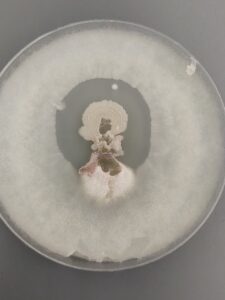The Greenhouse and Gardens Program – part of the University Sustainability unit in Mason Facilities – finished hosting 7 high school and undergraduate students for this summer’s Aspiring Scientists Summer Internship Program (ASSIP) managed by the College of Science.
Beginning in 2019, Doni Nolan, the Greenhouse and Gardens Program Manager, began to host ASSIP students each summer for an 8-week internship. ASSIP interns gain hands-on experience while conducting innovative research. Doni supervises, mentors, and supports each ASSIP student throughout their internship experience, utilizing the Greenhouse and Gardens Program’s sites, which include the Presidents Park Greenhouse, the Innovation Food Forest, and the Potomac Heights Garden.
“They’re always so enthusiastic and work great as a team,” said Doni. “I feel so lucky to have their help to continue my PhD research that also helps us grow more food at the [Presidents Park] Greenhouse. Some of the research has had significant results that inform our decision-making and lead to increased production.”
In 2023, the ASSIP students completed their internships in the Greenhouse, located on the Fairfax Campus. The Greenhouse produces approximately 1,000 pounds of produce – microgreens, lettuce, tomatoes, strawberries, herbs, and more – every year using a hydroponic system and an aquaponic system, both grow crops with water rather than soil.
Produce grown in the Greenhouse’s hydroponic system is provided to Mason Dining and incorporated into the salad and sandwich bars at the dining facilities. Hydroponic and aquaponic-grown produce is also made freely available for Mason Patriots who need food as part of the Greenhouse and Gardens Program’s food justice efforts – free pick-up times can be reserved here.
Hydroponic production encounters different challenges than soil-based production. In a moist environment with recirculating water, pathogens can emerge that feed on the growing plants. “Root rot” - where the roots of a growing plant are compromised – is often a consequence of these pathogens that ultimately leads to the loss of the affected plants.
This year’s ASSIP students committed to address this challenge. Students began their research in the Greenhouse to better understand how root rot could be prevented.
Through their research, the ASSIP students identified Pythium, which is a common and destructive phytopathogen that feeds on root tissues and new seedlings. This feeding can result in root rot and the death of young plants. However, diverse rhizo-microbiomes (the microbiome of root systems) are known to protect roots from microbial pathogens, if they contain the right bacteria and fungi. So, the students conducted research to determine which microorganisms might already be present in the Greenhouse and providing this protection.
ASSIP students assessed the ability of six different microbiome samples to inhibit the growth of Pythium sp. Potato dextrose agar was sterilized and poured into petri dishes, then inoculated with each of the samples, left for five days to incubate, and then observed under 1000x magnification using microscopes by the students.
After reviewing each of the samples, the students identified the bacteria B. subtilis as the dominant beneficial species throughout the Greenhouse’s systems. This bacterium created a zone of inhibition on the agar that exemplifies its ability to inhibit the growth of Phythium, and hence prevent root rot.


The ASSIP students suggested additional research be conducted to identify the strains of B. subtilis that they found and determine what protein causes the protection. If the Greenhouse cultivated healthy cultures of the strains of B. subtilis, it could decrease root rot and improve overall produce yields.
“The bacteria we found directly inhibited Pythium in the petri dish experiment we performed,” said Doni “I’m excited to take next year’s students to the lab with me to sequence the proteins it creates and discover the microbiology of what’s happening. This research could lead to journal publications and patents potentially in the future.”
Every year, the Greenhouse and Gardens Program hosts thousands of volunteers, dozens of interns, and special events. Mason Patriots and community members are invited to experience the Greenhouse and Gardens Program’s sustainable agriculture sites by volunteering. Learn more about the Greenhouse and Gardens Program’s sustainable agricultural efforts.
“I wouldn’t trade this opportunity at all,” said Anshu Palicherla, a Briar Woods High School student and part of the 2023 ASSIP. “Doni encouraged us to be curious and make mistakes. I developed a strong love for research and challenging the unknown, which I would like to continue into my future.”
Mason Facilities is a proud campus partner of the Institute for a Sustainable Earth’s (ISE) Mason as a Living Lab Initiative, encouraging and supporting student, faculty, and staff use of Mason’s campuses as living laboratories to develop and propose novel solutions to sustainability challenges.
REFERENCE: College of Science’s article about ASSIP: https://science.gmu.edu/news/deans-blog-aspiring-scientists-immersed-meaningful-stem-research-mason
